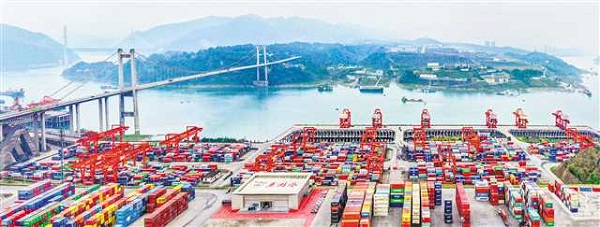..
Guoyan port to be intl cargo transfer station
Updated: 2022-06-21
english.liangjiang.gov.cn
 |
| A panoramic view of Guoyuan port. [Photo/Visual Chongqing] |
A major hurdle in logistics is that it is often hard to track real-time information on containers loaded onto trains and ships after they leave. This problem has now been addressed at Guoyuan port, located in Liangjiang New Area in Southwest China's Chongqing municipality.
By establishing a smart multi-model transport operation center, officials at the port are now able to monitor cargo in real time.
Also worth noting is that the port has set up 16 berths capable of bearing 5,000 metric-ton vessels, with the storage yard area extending 1.3 million square meters. The port is currently able to handle an annual throughput of 1.4 million containers, making it China's largest inland multi-model transport hub port.
The shipping lines connecting the port with Yibin, Luzhou and Guangyuan opened last year, and?the port?has been transformed from a small pier that only deals with domestic trade into a major transport hub. Its cargo throughput during the first quarter of this year stood at 5.85 million tons, up 16.48 percent year-on-year.
Data indicated that over the first five months, the numbers of China-Europe freight trains and new western land-sea corridor freight trains that departed from Guoyuan port rose by 6.99 percent and 59.02 percent, respectively.
The China-Europe freight trains going westward now connect with 27 countries and 72 cities. The Chongqing-Manzhouli-Russia freight trains have intensified Chongqing's trade exchanges with Russia and boosted logistical efficiency.
In 2021, Chongqing's foreign trade value exceeded 800 billion yuan ($119.12 billion), while its imports and exports from January to May were 4.6 percent higher than the national average.
Video

UK trade commissioner for China praised Chongqing as a burgeoning center in intelligent manufacturing.





